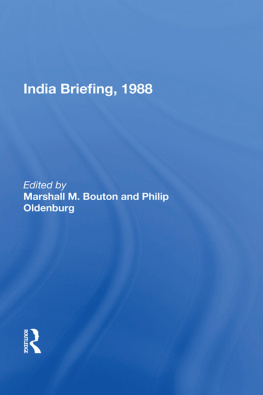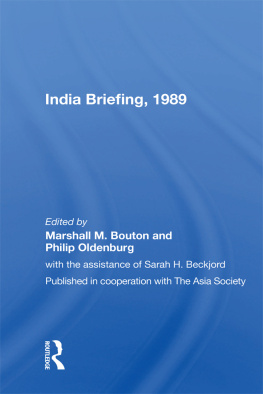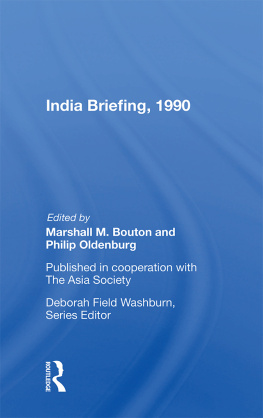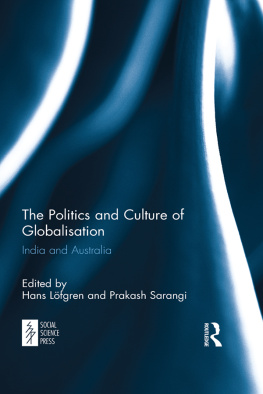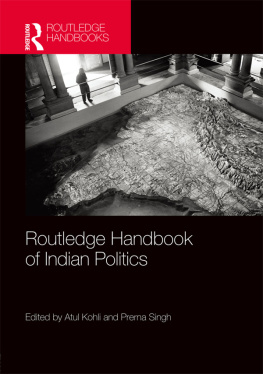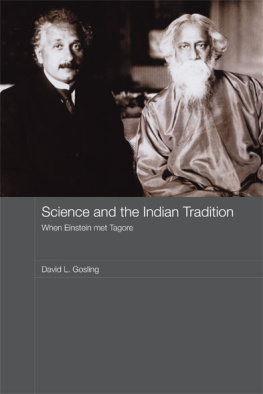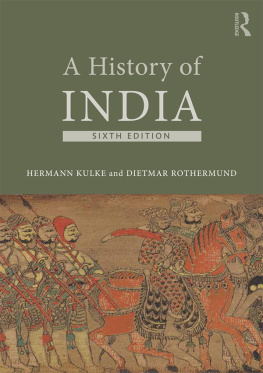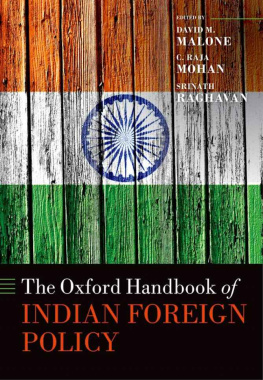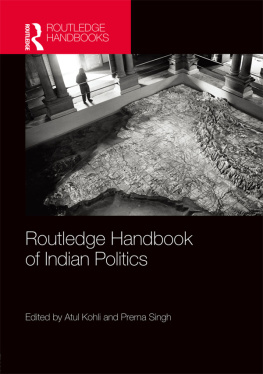India Briefing, 1988
First published 1988 by Westview Press
Published 2018 by Routledge
52 Vanderbilt Avenue, New York, NY 10017
2 Park Square, Milton Park, Abingdon, Oxon OX14 4RN
Routledge is an imprint of the Taylor & Francis Group, an informa business
Copyright 1988 by The Asia Society
All rights reserved. No part of this book may be reprinted or reproduced or utilised in any form or by any electronic, mechanical, or other means, now known or hereafter invented, including photocopying and recording, or in any information storage or retrieval system, without permission in writing from the publishers.
Notice:
Product or corporate names may be trademarks or registered trademarks, and are used only for identification and explanation without intent to infringe.
Library of Congress JSSN: 0894-5136
ISBN: 0-8133-0740-6
ISBN: 0-8133-0741-4 (pbk.)
ISBN 13: 978-0-367-00321-0 (hbk)
Contents
JAMES MANOR
T.N. SRINIVASAN
THOMAS PERRY THORNTON
RAJU G.C. THOMAS
KRISHNA KUMAR
WILUAM BLANPIED
Guide
While India continues to play key roles on the international stage, 1987 was a year of primarily domestic preoccupations in India. Severe drought and floods, combined with a sluggish economy, complicated the task of economic reform. Separatist terrorism and sectarian violence increased at home and among Tamil militants in Sri Lanka, where India sent troops to enforce a settlement of civil strife. Charges of corruption against members of Prime Minister Rajiv Gandhis government, defections from his ruling Congress (I) party, and regional electoral defeats threatened the governments popularity and support. At the same time, there appeared to be little prospect of serious economic setback or political breakdown.
India Briefing 1988 is the second volume in a new series of annual assessments of key events and trends in Indian affairs. Encouraged by the reception of India Briefing 1987, The Asia Society and Westview Press decided to continue this effort to offer the general reader an overview of Indian politics, economy, and foreign relations in 1987, as well as in-depth examination of other important topics in Indian life. The special topics covered in 1988 are national security, science and technology, and education.
This year, Philip Oldenburg joins Marshall M. Bouton in the co-editorship of the series. Marshall Bouton and The Asia Society are deeply grateful to Professor Oldenburg for agreeing at a late date to help bring the volume to press and for consenting to be part of this venture in the future. We look forward to the collaboration.
The editors wish to express great appreciation to the authors of India Briefing 1988. Their forebearance and cooperation under the extraordinary circumstances that surrounded the completion of the volume were exemplary. Their work is the heart of our effort. We are also grateful to Susan McEachem and her colleagues at Westview Press for their dedication to the enterprise and for their patience and understanding in completing this project.
Several individuals at The Asia Society helped make India Briefing 1988 possible. Sarah Beckjord skillfully managed the final editorial and manuscript preparation tasks, despite being new to her job and to this project. Earlier Linda Griffin Kean provided valuable assistance. Donatella Lorch carried out important research assignments and prepared the chronology. Andrea Sokerka, Rose Wright, and Chip Gagnon were crucial to the manuscript preparation.
Marshall M. Bouton
The Asia Society
Philip Oldenburg
Columbia University
23 August 1988
1
Politics: Ambiguity, Disillusionment, and Ferment
James Manor
In 1987, India celebrated the completion of four decades of self-government. It was a year in which it was easier to see how important political leaders, forces, and initiatives had run into trouble than to discern how they and Indias democracy might extricate themselves. It was, however, a year of ambiguity rather than of negativity and decline. There was plenty of political and social ferment, some of which led to destructive conflict and violence, but much of which appeared to have creative promise. It was a year of further disillusionment with Prime Minister Rajiv Gandhi, and of continuing doubts about the possibility of broad opposition unity. But Indias political system ended 1987 no less open or stable than it began the year, despite the worst drought of the twentieth century, terrorist outrages, severe communal violence, statist overreactions, populist extravagance, the deaths of two major political leaders, electoral humiliation for the party in power in New Delhi, revelations of monumental corruption, and much more. That is no small achievement.
It became apparent during 1987 that Rajiv Gandhi had largely abandoned his efforts, undertaken in 1985, to rebuild formal political institutions which had suffered damage in preceding years such as the cabinet ministries, the bureaucracy, and the courts. He was more than ever at a loss as to how to rebuild his Congress party, which had once been Indias most important political institution, but which has been in a wretched condition since the mid-1970s. It also became clear that his current five-year term as prime minister, which extends until the end of 1989, will be distinguished neither by a sustained liberalization of the economy nor by creative new state-led programs to promote development or social welfare. This means that he will be very short of programmatic achievements on which to base his reelection campaign in the next year. He will therefore have to depend on his own waning appeal and the possibility of opposition disarray; andsince these may not suffice, given the maturity and impatience of Indias mass electorateupon huge political gambles that rarely produce spectacular achievements.
Problems that Did Not Arise
Before plunging into a discussion of Indias political dilemmas, it is worth mentioning five problems which India did not face in 1987 and is unlikely to encounter soon, as a way of suggesting the scale of its political achievement over the last 40 years. First, India was not threatened by the prospect of a military coup. This owed a little to logistical factors. The size of the country and the structure of the armed forces, which prevents close contact between officers from different services until they reach senior ranks, make a coup difficult to coordinate. More important, the armed forces had enough confidence in civilian elites and in open politics that they were disinclined even to contemplate such action. They had also learned, by observing Pakistan and Bangladesh, the inadequacy of armies as instruments of government in complex societies.
Nor, despite much ill-formed comment to the contrary, was India about to fall apart. In part, the coercive power of the central government is more than sufficient to prevent regions or states within India from breaking away. But the threat of secession has never seriously arisen and is unlikely to do soexcept perhaps in the remote, hilly states of the far northeast which are ethnically and culturally distinct. Elsewhere, in mainstream India, secessionist movements of substance (as opposed to secessionist rhetoric) are unlikely to arise because would-be secessionists cannot generate enough solidarity at the state or regional level to sustain such movements. Perhaps the most distinctive feature of Indian society is its extreme heterogeneity, the ubiquity of variegated subgroups within sub-groups. That means, at one level, that the states and regions within India differ markedly from one another, which leads some observers to prophesy balkanization. But they overlook great heterogeneity within each of these varied states. It is for that reason that the current crisis in the Punjab is essentially a problem not of separatism but of bitter alienation between Sikhs and Hindus, and between Sikhs and the current government in New Delhi.



